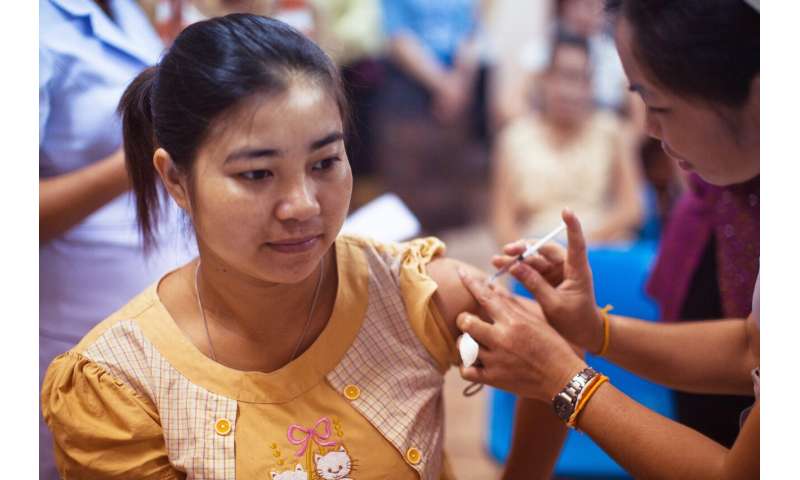
Promising results from large clinical trials testing three vaccines to prevent COVID-19 bring us a step closer to a widely available vaccine.
On Nov. 9, Pfizer’s interim analysis from its Phase 3 vaccine trial revealed it prevented 90 percent of COVID-19 cases. (The vaccine’s efficacy was revised to 95 percent in a recent more complete analysis of the data.) Just one week later, Moderna announced interim results from its own Phase 3 trial: its vaccine conferred 94.5 percent protection against illness.
On Nov. 23, AstraZeneca reported an interim analysis from two separate Phase 3 trials that looked at two dosing regimens. Its COVID-19 vaccine, developed with the University of Oxford in the United Kingdom, was 70 percent efficacious overall, with one dosage regimen protecting against the disease 90 percent of the time.
But a vaccine that works is useless if people are unwilling to take it.
Vaccine hesitancy
Polling in the United States and Canada reveals increasing distrust of COVID-19 vaccines. This distrust threatens the widespread uptake of the vaccine required to bring an end to the pandemic.
The proportion of Americans surveyed who “would get a potential coronavirus vaccine” has dropped to 52 percent in November from 72 percent in April. Notably, the November poll was conducted after Pfizer’s announcement.
A similar trend is seen in Canada. In July, 46 percent of Canadians polled indicated they would get vaccinated “as soon as possible,” 32 percent would “wait for others to go first and immunize later,” and 14 percent would not get vaccinated. After Pfizer’s announcement, Canadians surveyed were slightly more reluctant: only 40 percent would get a vaccine right away, while 36 percent would wait.
The World Health Organization defines vaccine hesitancy as “the reluctance or refusal to vaccinate despite the availability of vaccines,” and has identified it as a leading threat to global health. While vaccine hesitancy is a complex social phenomenon, with COVID-19 it is clear that the rapid pace of vaccine development and its perceived politicization are driving distrust.
Transparency builds trust
As vaccine developers and sponsors of ongoing trials, pharmaceutical companies are uniquely situated to help promote public trust in COVID-19 vaccines.
Pharma must ensure greater transparency in vaccine trials. Transparency will allow independent scientists to assess the rigor of trial designs and the reliability of results. Further, transparency may increase public understanding of and confidence in vaccine development.
Pharma has taken some steps in the right direction.
In September, nine companies developing COVID-19 vaccines issued a public pledge to be bound by science—not politics. They affirmed that vaccine development will be guided by “high ethical standards and sound scientific principles” and that applications for regulatory approval will only be made “after demonstrating safety and efficacy through a Phase 3 clinical study.”
Subsequently, four companies (AstraZeneca, Johnson & Johnson, Moderna and Pfizer) took the unusual step of making the protocols for their Phase 3 vaccine trials public. The protocol is the detailed plan for the trial, and it contains information on recruitment of volunteers, vaccine administration, participant followup and statistical analysis.
Two companies (AstraZeneca and Moderna) additionally made available consent documents provided to volunteers.
But pharma must go further.
Data monitoring committees
Phase 3 trials have independent data monitoring committees that review in real time any serious adverse events and trends in accumulating data. Traditionally, the membership of these committees is confidential, and their work is done in secret.
Of the data monitoring committees overseeing current COVID-19 vaccine trials, we know next to nothing. This may be business as usual, but in the face of a global pandemic, business as usual is not good enough.
Membership of data monitoring committees should be public. Trust would be enhanced by knowledge that people making key decisions about safety in COVID-19 trials have the requisite expertise, and they are not encumbered by conflicts of interest.
Adverse events
On Sept. 8, AstraZeneca’s vaccine trials were paused due to a serious adverse event. The next day, while a press release referred only to a “single event of an unexplained illness,” AstraZeneca’s CEO revealed in a phone call to investors that the adverse event involved a woman hospitalized with transverse myelitis, an inflammation of the spinal cord.
One month later, Johnson & Johnson’s Phase 3 vaccine trial was paused “due to an unexplained illness in a study participant.” No further details would be provided, said a company representative: “We must respect this participant’s privacy.”
If one were seeking to inflame distrust in vaccine trials, it is difficult to imagine a more effective strategy.
Pharma should publicly disclose details of any serious adverse event in a vaccine trial. Given the global attention focused on these trials, a pause—and the obvious inference that something bad has happened—is certain to become international news. In trials involving tens of thousands of people, sufficient details of the adverse event can be released without imperiling participant privacy.
Revealing the steps taken to investigate the adverse event and the reasons for restarting the trial are an opportunity to reinforce the careful oversight of vaccine trials and reassure an anxious public.
Open access to data
Finally, pharma should commit to making de-identified participant data from vaccine trials publicly available as soon as possible. This allows independent scientists to investigate and confirm the reliability of analyses. In the case of discrepant interpretations, these can be mediated and resolved in plain view.
Source: Read Full Article
